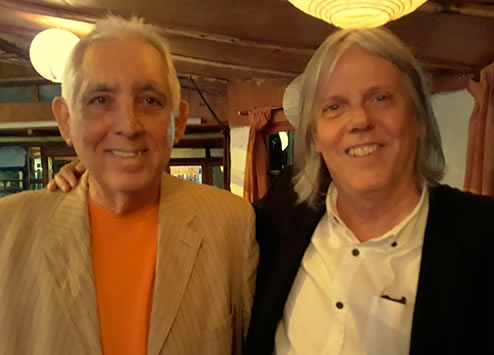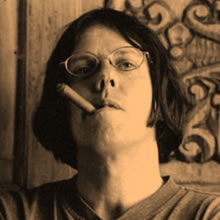El humor viral de Virulo
Lo de viral es porque su obra se propaga por Latinoamérica. Yo seguía a Alejandro García “Virulo”, desde que aparecía en televisión con su guitarra y sus canciones cargadas de sátira social. Después lo conocí en persona como Director del Conjunto Nacional de Espectáculos y aún le agradezco cómo nos ayudó a los humoristas emergentes. Separados un buen tiempo por tomar caminos diferentes, sólo en contacto tardío a través de e-mail y redes sociales, ahora tuve la oportunidad de compartir en Santiago al venir de gira por Chile. Esto provocó mis deseos de armar un buen diáloco con él. Por suerte, aceptó feliz. Y este es el resultado.
PP: ¿Cuándo decidiste hacerse humorista?
VIRULO: Ningún humorista que yo sepa decide ser así, creo que todos venimos con algún tipo de malformación que nos hace expresarnos de forma simpática para nuestros semejantes aunque estemos molestos y enojados, el síntoma más claro para detectar a un humoristas es cuando intenta hablar en serio y los demás se ríen.
PP: ¿Has sentido cambios entre el humorista Virulo de los inicios y el de ahora? Si es así, ¿cuáles serían?
VIRULO: Empezaré por lo que no ha cambiado: Sigo con deseos de divertirme, y de compartir lo que me divierte, aunque alguno no se divierta, quiero seguir jugando y no he perdido las ganas de jugar. Jugar con las palabras, jugar con los hechos, jugar con la historia. No he perdido la esperanza de seguir siendo niño a los 62 años. Me gusta el humor que nos hace reír como niños, por eso sigo admirando a Mark Twain y queriendo descubrir su magia.
Pero los años no pasan por gusto y uno aprende a saber lo que están esperando que digas y a mirar por los rincones y las intenciones ocultas de los que te rodean. Entonces, y esta es "la pregunta":¿cómo conservar la ingenuidad sin ser ingenuo y como conservar la frescura si ya no estás tan "fresco"?
Esa es la pelea diaria, lo que te puedo decir es que la sigo dando y trato de no decir nada con lo que no me comprometa y no me guste, ni decir nada que no me divierta aunque sepa que muchos se van a divertir.
La honestidad conmigo mismo es lo principal y creo que eso no ha cambiado a lo largo de mi vida, con errores y aciertos y creo que ya a estas alturas así soy.
PP: ¿Cuál ha sido el mejor y el peor momento de su carrera hasta el día de hoy?
VIRULO: Ocurrieron el mismo día: Iba yo por una céntrica calle de La Habana, cuando pasé por una escuela de niños entre 9 y 11 años. Los niños estaban formados y se dirigían a sus aulas en la misma dirección que yo llevaba, pero por fuera de la cerca; Al reconocerme los niños me empezaron a saludarme muy cariñosamente y con mucha admiración y entusiasmo, ellos de un lado de la cerca y yo del otro. Como el trayecto era largo, después de los primeros 20 metros se fueron apagando los saludos. Seguimos, ellos de un lado de la cerca y yo del otro, como 10 metros en silencio, hasta que de repente un negrito jodedor me gritó: “¡Virulo cara de culo!”. A partir de ahí empecé a recibir una cantidad de insultos inimaginables, acompañados de proyectiles que me lanzaban los infantes por sobre la cerca. Esto me hizo apresurar el paso y finalmente salir corriendo ante las miradas gozosas de la gente que esperaba el autobús en la calle y que fueron testigos de tan bochornosa escena. Definitivamente el público es muy veleidoso y no hay que exponerse mucho a sus miradas.
PP: ¿Tienes alguna fórmula para crear tu humor? ¿Cómo defines el humor que haces? ¿Te autocensuras?
VIRULO: No tengo fórmulas, pero si una cierta organización. Primero es la idea: ¿qué me preocupa?, ¿cómo lo quiero abordar?, ¿qué quiero decir? Después la forma:¿cómo será la letra y cómo será la música? Recuerda que yo pienso en canciones no en textos. Y por último: ¿cómo será la interpretación?
La autocensura siempre está presente cuando uno tiene una idea del alcance que pueden tener las palabras, pero si estás convencido te la juegas y dices lo que sea necesario y asumes las consecuencias.
Creo que las cosas hay que decirlas conscientemente porque en el humor siempre está presente el riesgo de decir algo que no piensas, al menos conscientemente, así que trato de elaborar lo más posible mis palabras para asumirlas completamente.
PP: Una pregunta de moda, pero importante. ¿Tiene límites el humor?
VIRULO: No.
PP: ¿Cómo ves el humor en Latinoamérica, y específicamente en Cuba y Miami?
VIRULO: En general veo un humor que no me gusta, mucha vulgaridad, poca elaboración y una gran confusión entre popular y populachero. No veo mucha diferencia entre lo que hacen en Cuba y en Miami.
He visto como todos aquellos universitarios que conocimos cuando surgió el movimiento de humor en Cuba rápidamente se han desembarazado de los conocimientos adquiridos para complacer a un público cada vez más ignorante, sin darse cuenta de que si siguen con su política complaciente sólo tendrán un público más difícil.
Existen por supuesto excepciones pero son pocos y nadan contra la corriente. En fin mi amigo "los tenemos acorralaos".
En Latinoamérica la situación es muy parecida, los stand up comedy latinoamericanos, que hilan groserías, majaderías y vulgaridades están a la orden del día, al punto que añoro a los cuenta-chistes de antaño.
En la televisión se repiten esquemas antiguos presentados como nuevos y el público los ve como novedosos.
Nada, que en la era de la información la gente prefiere vivir desinformada.
PP: Ya que lo mencionaste, dime lo que piensas hoy al recordar el fenómeno del humor cubano escénico de los años 80.
VIRULO: Después de todos estos años pienso que fue algo excepcional, algo raro y maravilloso. Unos jóvenes, universitarios en su gran mayoría, que cambiaron el gusto del humor de un país, de un país acostumbrado al choteo. Estos jóvenes se enfrentaron a la televisión y a un gusto enraizado en el costumbrismo para cambiar todo y lo lograron. Es difícil de creer que esto sucediera en los años 80 y que el panorama actual sea tan desalentador, y lo que es peor que algunos de los humoristas nacidos en aquellos tiempos nieguen lo que hicieron con su ejercicio actual.
Hoy como un viejo loco siempre les repito lo mismo, recuerden que son universitarios, que son cultos, no se rindan. El humor es un arte y tiene que servir para que la gente aprenda y crezca, no para alimentar sus monstruos y reafirmar su ignorancia.
La verdad es que durante los últimos seis años repetí esto en Cuba y lo único que logré es que me apartaran e incluso que me negaran como bicho raro. Pero estoy convencido de que esa llama está ahí, oculta, pero viva y en cualquier momento nos da una sorpresa, y nos pone a reír a todos.
PP: Para finalizar la entrevista: en tu carrera, ¿quieres hacer algo que no hayas hecho?
VIRULO: Dos cosas: quiero escribir mis memorias, me tocó una época muy rica y conocí muchas cosas de primera mano y conozco muchas historias divertidas.
Y escribir un espectáculo para niños. Me gustaría hablarle a los niños reales y cantarle a las cosas que les interesan. Tengo dos hijos aun pequeños y se los debo.
Gracias Pelayo por este diáloco y por compartir una parte importante de tu historia conmigo. Te recuerdo bien y me divertí mucho en el tiempo que nos tocó trabajar juntos.
PP: Gracias a ti, Virulo, por aceptar compartir conmigo este diáloco. Es cierto, la pasamos muy bien cuando nos tocó trabajar juntos. Así como la pasamos bien ahora. Y que se te cumplan los dos proyectos que tienes en mente.


Interview with Alejandro García "Virulo"
By Pepe Pelayo
Virulo's viral humor
The viral thing is because his work spreads throughout Latin America. I followed Alejandro García “Virulo” since he appeared on television with his guitar and his songs full of social satire. Later I met him in person as Director of the National Entertainment Group and I still thank him for how he helped us emerging comedians. Separated for a long time by taking different paths, only in late contact through email and social networks, now I had the opportunity to share in Santiago when coming on tour in Chile. This made me want to have a good conversation with him. Luckily, he happily accepted. And this is the result.
PP: Have you felt changes between the comedian Virulo at the beginning and the one now? If so, what would they be?
VIRULO: I'll start with what hasn't changed: I still want to have fun, and share what amuses me, even if some people don't have fun, I want to continue playing and I haven't lost the desire to play. Play with words, play with facts, play with history. I have not lost hope of still being a child at 62 years old. I like humor that makes us laugh like children, that's why I continue to admire Mark Twain and want to discover his magic.
But the years don't pass by by chance and you learn to know what they are waiting for you to say and to look into the corners and the hidden intentions of those around you. So, and this is "the question": how to preserve naivety without being naive and how to preserve freshness if you are no longer so "fresh"?
That is the daily fight, what I can tell you is that I continue fighting it and I try not to say anything that I am not committed to and that I do not like, nor say anything that I do not enjoy even though I know that many are going to have fun.
Honesty with myself is the main thing and I think that has not changed throughout my life, with mistakes and successes and I think that at this point that is how I am.
PP: Do you have a formula to create your humor? How do you define the humor you do? Do you self-censorship?
VIRULO: I don't have formulas, but I do have a certain organization. First is the idea: what worries me? How do I want to address it? What do I want to say? Then the form: what will the lyrics be like and what will the music be like? Remember that I think in songs not in texts. And finally: what will the interpretation be like?
Self-censorship is always present when one has an idea of the reach that words can have, but if you are convinced you take the risk and say what is necessary and assume the consequences.
I think things have to be said consciously because in humor there is always the risk of saying something you don't mean, at least consciously, so I try to elaborate my words as much as possible to fully assume them.
PP: A fashionable question, but an important one. Does humor have limits?
VIRULO: No.
PP: How do you see humor in Latin America, and specifically in Cuba and Miami?
VIRULO: In general I see humor that I don't like, a lot of vulgarity, little elaboration and a great confusion between popular and popular. I don't see much difference between what they do in Cuba and in Miami.
I have seen how all those university students that we met when the humor movement emerged in Cuba have quickly gotten rid of the knowledge acquired to please an increasingly ignorant public, without realizing that if they continue with their complacent policy they will only have a larger audience. difficult.
There are of course exceptions but they are few and swim against the current. Anyway my friend "we have them cornered."
In Latin America the situation is very similar, Latin American stand up comedy, which spouts rudeness, nonsense and vulgarities, is the order of the day, to the point that I long for the joke tellers of yesteryear.
On television, old schemes are repeated, presented as new, and the public sees them as new.
Nothing, in the information age people prefer to live uninformed.
PP: Since you mentioned it, tell me what you think today when remembering the phenomenon of Cuban stage humor of the 80s.
VIRULO: After all these years I think it was something exceptional, something rare and wonderful. Some young people, mostly university students, who changed the taste of humor in a country, a country accustomed to jokes. These young people faced television and a taste rooted in customs to change everything and they achieved it. It is difficult to believe that this happened in the 80s and that the current panorama is so discouraging, and what is worse is that some of the comedians born in those times deny what they did with their current practice.
Today, like a crazy old man, I always repeat the same thing to them: remember that you are university students, that you are cultured, don't give up. Humor is an art and it has to serve to help people learn and grow, not to feed their monsters and reaffirm their ignorance.
The truth is that during the last six years I repeated this in Cuba and the only thing I achieved was that they separated me and even denied me as a weirdo. But I am convinced that that flame is there, hidden, but alive and at any moment it gives us a surprise, and makes us all laugh.
PP: To finish the interview: in your career, do you want to do something that you haven't done?
VIRULO: Two things: I want to write my memoirs, I lived in a very rich time and I learned many things firsthand and I know many funny stories.
And write a show for children. I would like to talk to real children and sing to the things that interest them. I have two children who are still small and I owe them to them.
Thank you Pelayo for this dialogue and for sharing an important part of your story with me. I remember you well and I had a lot of fun during the time we had to work together.
PP: Thanks to you, Virulo, for agreeing to share this dialogue with me. It's true, we had a great time working together. Just like we have a good time now. And may the two projects you have in mind come true.
(This text has been translated into English by Google Translate)

